 | | | 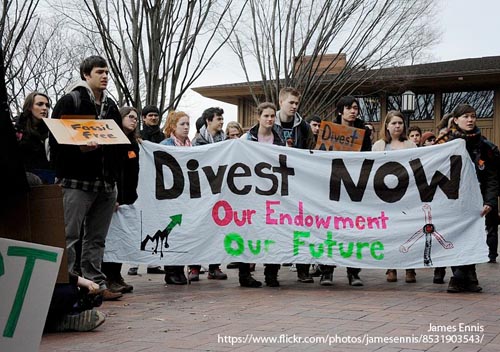 With fall semesters well under way across the country despite the surge of the Delta variant, campus sustainability efforts and activism for environmental justice and fossil fuel divestment are rising, too. In this September issue of the RCC Campus Dispatch, we share stories of the widespread sustainability work that is happening on campuses and the calls for action now being met. In the early stages of fall semester alone, a number of institutions have announced their intention to divest from fossil fuels. Chief among them is Harvard University. The historic institution announced that, over time, it will divest all fossil fuels from their $41 billion dollar endowment, the largest in the nation. This signaled a massive victory for divestment movements across the country, and for the climate movement at large. With fall semesters well under way across the country despite the surge of the Delta variant, campus sustainability efforts and activism for environmental justice and fossil fuel divestment are rising, too. In this September issue of the RCC Campus Dispatch, we share stories of the widespread sustainability work that is happening on campuses and the calls for action now being met. In the early stages of fall semester alone, a number of institutions have announced their intention to divest from fossil fuels. Chief among them is Harvard University. The historic institution announced that, over time, it will divest all fossil fuels from their $41 billion dollar endowment, the largest in the nation. This signaled a massive victory for divestment movements across the country, and for the climate movement at large. In addition, new cohort of Rachel Carson Council Fellows (2021-2022) you’ll find in this issue includes three RCC Fellows who will continue the organizing surge for divestment at Tulane, UNC-Chapel Hill, and Claremont-McKenna. You’ll also find advice for overcoming student despair about climate change, books and reviews, how to bring RCC speakers and organizers to your campus, and more. | | | | | | | | | | | | | | Powerful Ripples In The Environment: The Effects Of University Sustainability Action Damage from climate change respects no geographic, political or cultural boundaries. These dangers demand a unified global response, as the latest reports from the Intergovernmental Panel on Climate Change remind us. Climate change also thwarts progress on the United Nations’ 17 sustainable development goals. I believe long-term solutions to these threats must happen locally, one ecosystem at a time. | | | | | | Colorado State University Pueblo Becomes First University in Colorado to Reach Net Zero Efficiency with Solar Power Colorado State University-Pueblo became the first campus in the state to reach net-zero efficiency last week when the school switched on its 23-acre solar array project. The solar scheme allows the campus to generate excess energy and put it back into the grid. “One of my bold goals for Colorado is reaching 100% renewable energy by 2040, and it’s thanks to our institutions of higher ed like CSU-Pueblo, I’m confident we’ll get there,” Gov. Jared Polis said on the school’s Facebook page. | | | | | | | | Emory University to update medical school curriculum to include climate risks Medical students successfully pushed for the change. Climate change increases the risks of many health problems, such as heat stroke and asthma. “Despite this … my peers and I, as we sat in our first-year medical school lecture halls, we really heard no mention of this whatsoever,” says Emaline Laney, a student at the Emory University School of Medicine. “We ended up really one by one going through every single lecture we ever went through throughout our medical school curriculum,” she says. | | | | | | UMBC's Freeman Hrabowski Reflects on His Presidency Freeman Hrabowski, the longtime president of UMBC, built a legacy challenging the assumption that only prestigious, wealthy colleges foster educational excellence. Freeman Hrabowski made headlines last month when he announced his plan to retire. After three decades as president at the University of Maryland, Baltimore County, Hrabowski will step down at the end of the academic year. | | | | | | Old Dominion U to Begin Phasing Out Single-Use Plastic Items During the fall semester, Old Dominion University students, faculty and staff will notice changes across campus. Aluminum water cans will begin replacing plastic bottles in vending machines, retail operations and catered events. The University Bookstore will no longer use plastic bags. Aramark will phase in paper bags as each retail brand partner gets them set up for ODU to order. The Monarch community will be encouraged to bring reusable bags. They will also be urged to use reusable food containers available in the dining areas on campus. | | | | | | | | How Students Pressured Harvard to Divest From Fossil Fuels– and Won Climate activists at other institutions can learn from Fossil Fuel Divest Harvard after their victory at the world’s richest university. For nearly a decade, we petitioned, protested, and politicked. We met with members of the Harvard Corporation, several of whom have personally profited from the fossil fuel industry, only to hear them repeat the same empty talking points. We risked and incurred arrest storming the Harvard-Yale field in the largest university divestment protest ever | | | | | | Oberlin College Secures $80 million in Certified Climate Bonds for Sustainable Infrastructure Program Investors rallied around Oberlin College and Conservatory’s path-breaking geothermal infrastructure project last week, pouring $80 million into one of higher education’s first Certified Climate Bond offerings, according to a news release. The certification by the Climate Bonds Initiative (CBI) indicates that independent experts have verified the environmental benefit of Oberlin’s Sustainable Infrastructure Program (SIP), in alignment with the goals and targets of the Paris Climate Agreement, the release said. | | | | | | | | | | Macalester College Divests From Oil and Gas Macalester College announced Monday it would divest all publicly traded oil and gas assets, including those with Enbridge Inc., the natural gas company behind the Line 3 oil pipeline project, KSTP reported. Students had been pushing for divestment in protest of the pipeline, which would run from the tar sands region in Canada to the western tip of Lake Superior near the Minnesota-Wisconsin border, according to Minnesota Public Radio. The private college in Saint Paul also adopted a policy prohibiting future investments that are entirely in oil and gas companies, but not necessarily investments in portfolios that include oil and gas. | | | | | | | | | | Amherst College Vows Divestment From Fossil Fuels by 2030 Amherst College is pledging to make no new investments in gas and oil and fully divest its nearly $2.5 billion endowment from fossil fuel investment funds by around 2030. In a letter sent to students, faculty, staff and alumni Wednesday, board of trustees Chairman Andrew J. Nussbaum announced the decisions made by the board to bring the college closer to sustainability and meeting the goals of its Climate Action Plan. “This announcement largely formalizes actions that have been in place for years,” Nussbaum wrote. “We have neither held direct investments in fossil fuel companies nor made new commitments to fossil fuel funds in over 2 years.” | | | | | | Princeton University Widens Net-zero Goals and Lays Out Dissociation Process to Advance Action on Climate Change In keeping with its core truth-seeking mission and commitment to sustainability, Princeton University has established an administrative process for dissociating from companies engaged in climate disinformation campaigns or that are involved in the thermal coal and tar sands segments of the fossil fuel industry. The University also has committed to reducing the aggregate harmful climate impact of the entirety of the University’s direct and indirect endowment holdings. | | | | | | | | How to Stop Climate Change Despair in the New Generation? According to Humboldt State’s Sarah Ray we need more than a science/tech approach. Sarah Ray, a professor of environmental studies at Humboldt State University in Arcata, California, has had a front row seat to the way climate change has landed on young people and most notably, how the weight of that anxiety has changed over the decade-plus years she’s been a professor. | | | | | | Indigenous Wisdom for the Climate Crises Kyle White, environmental justice professor at Michigan says we can learn from Indigenous wisdom, that to solve the climate crisis, we must first repair our relationships. Climate change is often thought of in linear time, as in a series of events leading toward something. How if we don’t limit warming to under 2 degrees Celsius in the next several decades, for example, we face a cascade of natural disasters. But Kyle Whyte, an environmental justice professor at the University of Michigan, suggests that climate change should also be thought of through a concept known as “kinship time.” | | | | | | My Island Does Not Want to Be Resilient. We Want a Reclamation. Unlearning Academic Jargon to Understand and Amplify Beauty and Power in Puerto Rico. I come from an island that basks under the watch of a life-giving sun. Her Sunday mornings shake in the wake of a boisterous chinchorreo, or quiver to the rhythmic chants of worship and prayer. It is an island prone to block parties and natural disasters. Summer afternoons are clouded with the ebb and flow of traffic, Saharan dust, and, after yet another power outage, the diesel-powered hums of tens of thousands of generators. | | | | | | | | 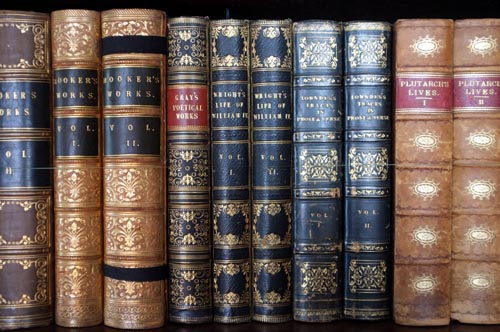 | | | 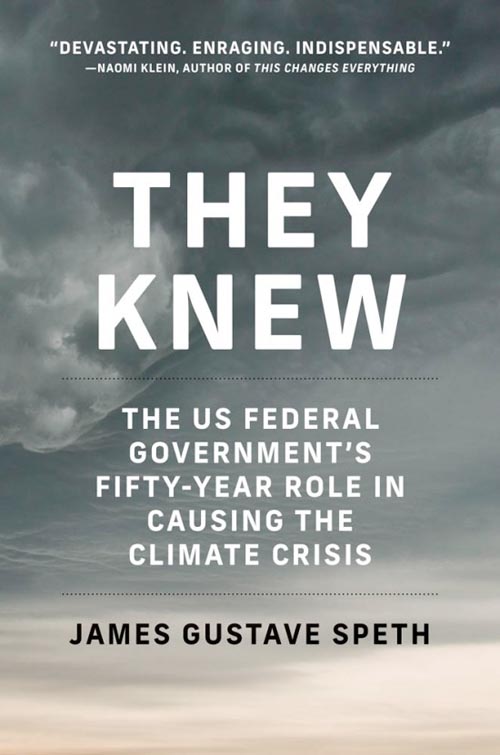 In 2015, a group of twenty-one young people sued the federal government in Juliana v. United States for violating their constitutional rights by promoting climate catastrophe and thereby depriving them of life, liberty, and property without due process and equal protection of law. They Knew offers evidence supporting the children's claims, presenting a devastating and compelling account of the federal government's role in bringing about today's climate crisis. James Gustave Speth, tapped by the plaintiffs as one of twenty-one preeminent experts in their climate case, analyzes how administrations from Carter to Trump—despite having information about the impending climate crisis and the connection to fossil fuels—continued aggressive support of a fossil fuel based energy system. In 2015, a group of twenty-one young people sued the federal government in Juliana v. United States for violating their constitutional rights by promoting climate catastrophe and thereby depriving them of life, liberty, and property without due process and equal protection of law. They Knew offers evidence supporting the children's claims, presenting a devastating and compelling account of the federal government's role in bringing about today's climate crisis. James Gustave Speth, tapped by the plaintiffs as one of twenty-one preeminent experts in their climate case, analyzes how administrations from Carter to Trump—despite having information about the impending climate crisis and the connection to fossil fuels—continued aggressive support of a fossil fuel based energy system.
“Devastating. Enraging. Indispensable. Would that the world had more heroic elders like Gus Speth. He has produced a damning record that will become a potent tool for justice.”
—Naomi Klein, Gloria Steinem Chair in Media, Culture, and Feminist Studies at Rutgers University; author of This Changes Everything, The Shock Doctrine, and No Logo
“With skill and dedication, Gus Speth has documented precisely what we knew and when we knew it. This book is a shocking reminder of the chances for action we’ve already missed, and a spur to finally move with the vigor the climate crisis demands.”
—Bill McKibben, Schumann Distinguished Scholar in Environmental Studies at Middlebury College; founder, 350.org READ MORE AND BUY HERE • • • • • Penguin Classics Launches ‘new canon’ of Environmental Literature  “From Greta Thunberg to James Lovelock, publisher Penguin Classics has come up with a “new canon” of the environmental literature, which it believes has “changed the way we think and talk about the living Earth”. “From Greta Thunberg to James Lovelock, publisher Penguin Classics has come up with a “new canon” of the environmental literature, which it believes has “changed the way we think and talk about the living Earth”.
The move is part of a growing trend in publishing for books focused on the climate, whether from big hitters such as David Attenborough or Bill Gates, whose How to Avoid a Climate Disaster was out in February, or so-called “cli-fi”, climate fiction, from writers including Richard Powers and Jenny Offill. Penguin’s Green Ideas series capitalizes on this appetite, collecting 20 short books it believes constitute “the classics that made a movement”, by “visionary thinkers around the world [who] have raised their voices to defend the planet”...” READ MORE... | | | | | | |  Our 2021 - 2022 cohort for the Rachel Carson Council Fellowship Program is now on campus and organizing for sustainability and environmental justice in a semester where the climate crisis has never felt more present. Read about their projects and the Fellows themselves here. Our 2021 - 2022 cohort for the Rachel Carson Council Fellowship Program is now on campus and organizing for sustainability and environmental justice in a semester where the climate crisis has never felt more present. Read about their projects and the Fellows themselves here. 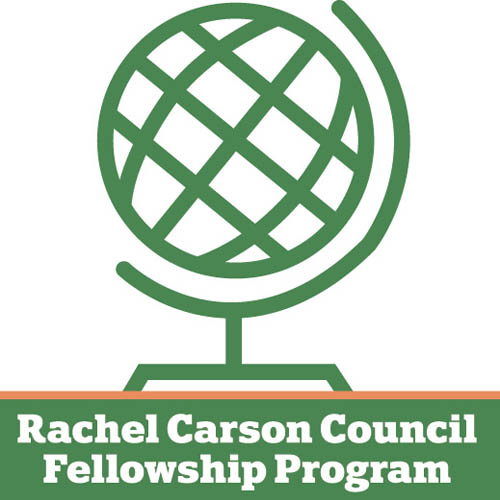 The RCC Fellowship Program is designed to identify students with a passion for environmental education, organizing and advocacy and provide them with training in Washington, DC, mentorship from RCC environmental staff, financial support to do the valuable work they care about, and become life-long advocates for the environment. RCC Fellows become leaders and active participants in the RCC’s national campus program with over 5,000 active faculty, students, staff, and administrators at 57 campuses. As part of the RCC team, Fellows also help build RCC’s network of active students and faculty and have the opportunity to publish and speak on behalf of a respected national organization. The RCC Fellowship Program is designed to identify students with a passion for environmental education, organizing and advocacy and provide them with training in Washington, DC, mentorship from RCC environmental staff, financial support to do the valuable work they care about, and become life-long advocates for the environment. RCC Fellows become leaders and active participants in the RCC’s national campus program with over 5,000 active faculty, students, staff, and administrators at 57 campuses. As part of the RCC team, Fellows also help build RCC’s network of active students and faculty and have the opportunity to publish and speak on behalf of a respected national organization.
Learn more about the RCC Fellowship program here | | | | | | Plan Your 2021-2022 Campus Events with RCC now! 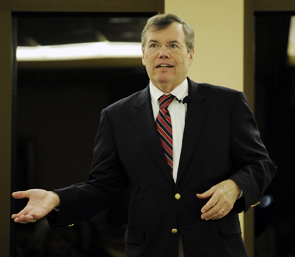 For the first time in over a year, RCC President & CEO, Dr. Robert K. Musil, a national leader in climate change, environmental justice and health is again available to book for in-person campus speaking events! Musil has been called “informative, challenging and inspirational all at once.” He is “motivational” with “intellectual depth” and “extraordinary impact.” For the first time in over a year, RCC President & CEO, Dr. Robert K. Musil, a national leader in climate change, environmental justice and health is again available to book for in-person campus speaking events! Musil has been called “informative, challenging and inspirational all at once.” He is “motivational” with “intellectual depth” and “extraordinary impact.”
Dr. Musil is available for campus lectures and visits involving classes, meetings with campus and community groups, consultations with faculty and administrators, or for Earth Day, Commencement, and other special events. Stays range from one to three days. Reduced fees are in place for 2021-2022 and can be designed to meet reduced budgets. To arrange a campus visit with Dr. Musil, contact the RCC President’s Office at office@rachelcarsoncouncil.org or call 301-214-2400. Dr. Musil is also available to CIC members (Council of Independent Colleges) as a CIC Visiting Fellow (formerly Woodrow Wilson) for stays of a week through the CIC Visiting Fellows Program here.  The RCC also offers talks, classes, and workshops on student engagement, activism, sustainability, and the RCC Fellowship program with Associate Director Mackay Pierce. The RCC also offers talks, classes, and workshops on student engagement, activism, sustainability, and the RCC Fellowship program with Associate Director Mackay Pierce.
To arrange a visit, contact our Associate Director Mackay Pierce at: mackay@rachelcarsoncouncil.org | | | | | |  The Rachel Carson Council Depends on Tax-deductible Gifts From Concerned Individuals Like You. Please Help If You can. The Rachel Carson Council Depends on Tax-deductible Gifts From Concerned Individuals Like You. Please Help If You can. | | | |  Sign Up Here to Receive the RCC E-News and Other RCC Newsletters, Information and Alerts. Sign Up Here to Receive the RCC E-News and Other RCC Newsletters, Information and Alerts. | | | | | | | | | | | |